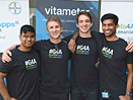Innovation
Vitameter returns from Bayer’s accelerator
January 20, 2016
 WATERLOO, Ont. – Velocity Foundry startup Vitameter has returned from Germany after spending the last four months at Bayer Grants4Apps Accelerator. Vitameter uses nanotechnology and bio-sensors to create a personal handheld device that allows people to track their vitamin levels, and eventually other biomarkers with a single drop of blood in the comfort of their home.
WATERLOO, Ont. – Velocity Foundry startup Vitameter has returned from Germany after spending the last four months at Bayer Grants4Apps Accelerator. Vitameter uses nanotechnology and bio-sensors to create a personal handheld device that allows people to track their vitamin levels, and eventually other biomarkers with a single drop of blood in the comfort of their home.
Each test is inexpensive and provides the information needed to manage diet and supplements. Last year, Vitameter won $25,000 for the device in the Velocity Fund Finals, and also garnered a $10,000 award as the best hardware startup. The Vitameter device can tell users if they need to increase or decrease their intake of vitamins and supplements.
Velocity caught up with Business Lead Bobby Green, and Co-Founder James Maclean to discuss their time spent in Berlin, Germany, what they learned, and their goals for Vitameter.
Q: A year ago Vitameter won both the $25K and the $10K Velocity Fund Finals. How has your company grown since then?
A: We started as one of the first groups in Velocity Science, and moved into the Foundry last May. That allowed us to have a permanent workspace to work in and expand our team. Since then, we’ve kept up the momentum, winning the Velocity Fund Finals, moving to Germany to work at Bayer, releasing our first prototype, and now we’re looking to raise and start beta-testing our prototype, so that will be our next big milestone.
Q: What are your current goals for Vitameter, or alternatively, your vision for the future?
A: On the business side of things, we’re doing the raising process, running through the clinical trials which are required to get to market, and doing the legwork needed to get us to pre-sales, and then eventually sales, hopefully a year from now. We are doing the beta testing of the product and looking for people, so anyone interested can contact us.
Q: How did Vitameter develop while being at Bayer Grants4Apps Accelerator?
A: We got a global perspective of the healthcare industry, which was quite helpful in developing our business plan. In addition, we were sitting right next to top scientists so we were able to continue our prototype development in their collaborative space. This was similar to Velocity Science, but at a different scale. Some of the direct mentorship we received from Bayer executives helped impose the idea of metrics-based tracking, which is definitely something Vitameter will incorporate.
Q: Any interesting stories that occurred during your time at Bayer?
A: It was hard to convince security to let us work past 10 pm because it’s illegal in Germany for employees to work past certain hours. We had to get special permission to come in on the weekends and got yelled at by security guards all the time.
Q: What advice would you give future startups about preparing for the shift from working at an incubator like Velocity, to working at an accelerator?
A: Make sure you understand the country you’re going to, and their import and export laws, as well as the costs and time delays associated with moving hardware. We weren’t prepared for those changes and it cost us some drawbacks in productivity. Some good things, amongst many, about being at an accelerator are stricter deadlines which push one’s productivity.
Q: If you could give Velocity companies some parting advice, what would it be?
A: People are too okay with failure, startups especially, and it’s slightly glorified in the industry. Realistically, you want to avoid that, as redundant as that sounds. Have dialogue with as many people as you can; it’s an invaluable resource for anyone starting a new business. Sleep tomorrow.
